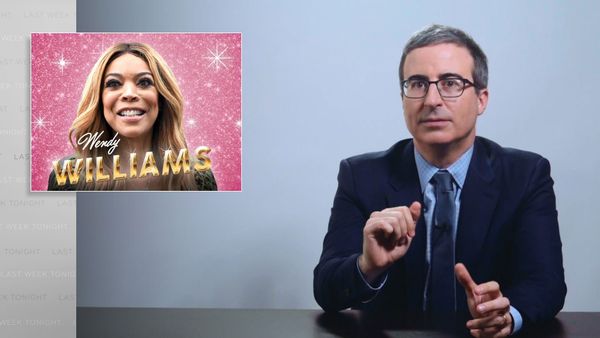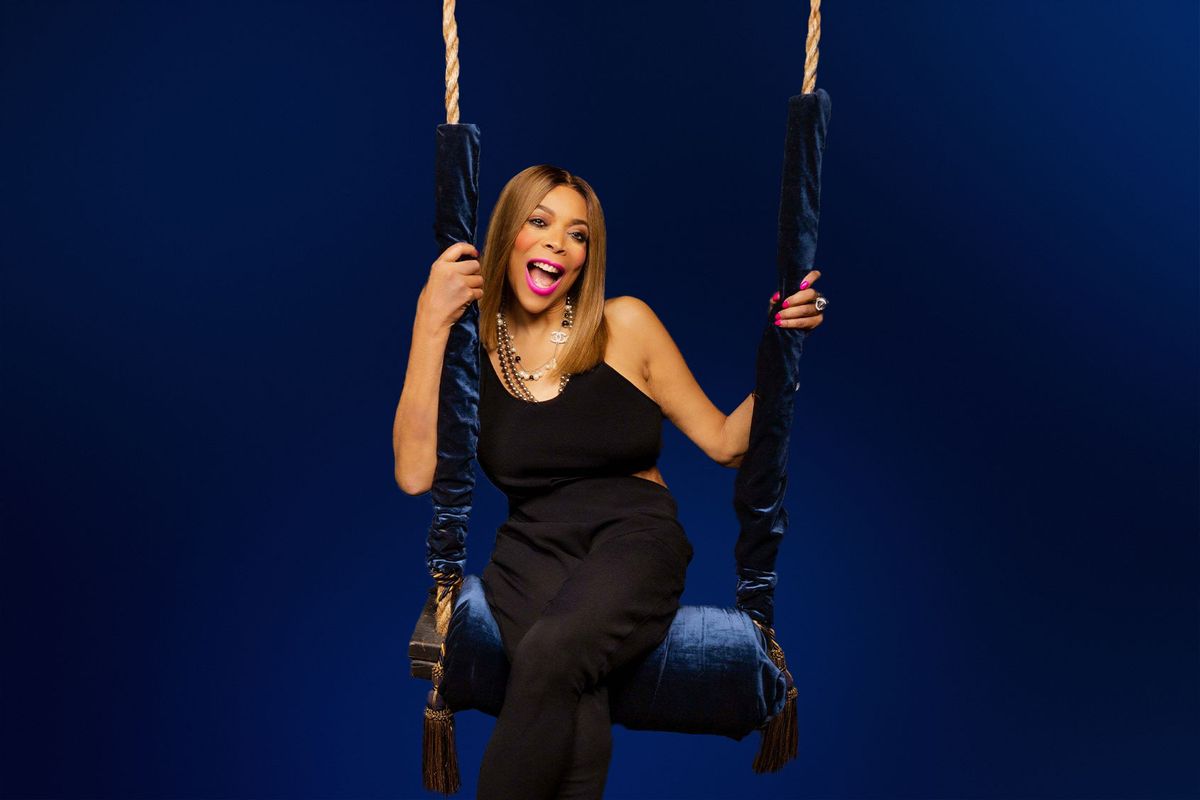Three years ago Wendy Williams declared herself “the queen of ‘I don’t care.’” She was responding to a Los Angeles Times reporter asking if there was anything she said in the 2021 documentary “Wendy Williams: What a Mess!” that she wished she could have rephrased.
Once you’ve seen that movie – which you should; it’s streaming on Hulu – you may understand why the interviewer was compelled to ask that question. By the standards of most no-holds-barred authorized portraits, “What a Mess!” was the truth equivalent of a below-the-belt bludgeoning, with nearly all the blows targeting Williams’ ex-husband and former manager Kevin Hunter.
Hunter did not participate in that project, a decision that might have something to do with the surfeit of photographic evidence of his years-long affair with a woman for whom he bought a house and a very nice car with Williams’ money. Little to none of this was news to her loyal audience, with whom she’d shared enough personal details about her life over 14 years of “The Wendy Williams Show” to seemingly obliterate the border between her private and public selves.
What they may not have known can’t have shocked them, like Williams’ admission that she drove to the home of Hunter’s mistress, spray-painted a message on her door and sealed her mailbox shut with Gorilla Glue before painting it pink. Essentially she’s a real-life, free-range Bravo-style Housewife, only better — until now, she's had full control over how she’s edited.
Long after we’ve sorted through Williams’ overflowing drawer of personal dramas, health crises, and fodder for Hot Topics, we might fully appreciate her as one of our era’s foremost experts in fame and parasocial relationships. She understands how much we're dying to know famous people as opposed to merely knowing about them.
And she applies that proficiency most abundantly and strategically to herself.
Williams’ candor about her struggles with Graves' disease, lymphedema and substance abuse highlighted her humanity; her on-air instances of rape victim blaming, including defending R. Kelly, along with saying she was sick of #MeToo and much more, underlined the extent of her unfiltered thoughtlessness.
But Lifetime's “Where is Wendy Williams?” may provide the most breathtaking view of her yet, one that she didn’t and couldn’t fully plan for.
The four-and-a-half-hour, two-night event is the final entry in a three-project deal Williams signed with Lifetime, preceded by “What a Mess!” and “Wendy Williams: The Movie,” both of which premiered on the same weekend in 2021.
Williams has long understood why people love gossip and equally adore and abhor gossips: they cause controversy, and sometimes force a public, corrective response.
Production began in August 2022, shortly after Williams’ long-running daytime hit was canceled. Similar to those other Lifetime movies she executive produced, “Where is Wendy Williams?” was intended as an image-burnishing behind-the-scenes chronicle of Williams’ comeback as a podcaster. It should have been a natural transition for Williams given her rise in radio before her TV reign and sustained popularity during the 12 seasons she spent with her viewers.
(The 13th and final season of “Wendy Williams” was steered by guest hosts, the most popular of which was Sherri Shepherd. She launched her self-titled show in the fall of 2022.)
But soon the crew, which includes two of Williams’ co-executive producers –Tara Long, and Mark Ford, who worked with her on “What a Mess!” – noticed something was off.
According to a summary from Lifetime, their cameras captured the 59-year-old star’s “delicate state of mind, erratic behavior and declining health.” In one clip Williams's driver admits, “I think she’s losing memory."
Producers also filmed what Williams’ life is like under a court-issued financial guardianship about which her family had no say. This also happened in 2022, when representatives of Wells Fargo successfully petitioned to have her placed under one in response to allegations that she was of “unsound mind.”
Filming stopped in April 2023 when Williams entered a facility to treat “cognitive issues,” according to People.
We need your help to stay independent
Lifetime only provided review screeners to select parties, including People and “The View,” where on Thursday co-host Sunny Hostin observed that Williams seemed confused, disoriented and was drinking heavily. “Her mental and physical health seems to be very concerning,” she said.
At the end of “The View” segment, co-host Whoopi Goldberg shared a statement from Williams’ team that she’s been diagnosed with primary progressive aphasia and frontotemporal dementia.
“The View” hosted her niece Alex Finnie, who shared that Williams’ family was excluded from the guardianship decision, and hasn’t been able to contact her — she can only reach out to them, Finnie explained. At this, the hosts asked the obvious question: does Williams realize what she looks like?
According to Finnie, yes. “She was adamant that she wanted to control the narrative of her story,” Finnie said, adding, “Despite conversations that I had with her, this was what she wanted to do. . . .[H]er ultimate decision was that ‘Everybody's telling my story, no matter how painful it is, I want to tell it.’”
(A statement from Williams' team, whoever that consists of, backs this assertion. "Wendy is still able to do many things for herself,” it says in its diagnosis announcement. “Most importantly she maintains her trademark sense of humor and is receiving the care she requires to make sure she is protected and that her needs are addressed.")
Another role Williams’ docuseries may play, however coincidentally, is to enable her to have some version of a last word at a stage when her voice is failing her.
Docuseries like this can be cultural hammers breaking walls of silence and ringing alarm bells motivating action to be taken against injustice. Lifetime's sustained examination of R. Kelly’s string of unpunished sexual assaults and the abetting forces in the music industry and justice system allowing him to remain free finally led to charges, trials, and convictions.
FX and The New York Times’ look at Britney Spears’ exploitative conservatorship spurred a public outcry that eventually helped secure her emancipation. Hostin observed that Williams’ predicament resembles that of Spears, a conclusion at which “Where is Wendy Williams?” may arrive.
Another role Williams’ docuseries may play, however coincidentally, is to enable her to have some version of a last word at a stage when her voice is failing her.
Another star to go public with their aphasia diagnosis is Bruce Willis, a revelation to which the culturati responded with respectful ponderings about the cruel irony of such an ailment befalling a man whose career was built on nimble dialogue delivery.
I'd wager fewer folks would mourn Williams' situation if she hadn’t insisted on “Where is Wendy Williams?” moving forward, and for reasons that have nothing to do with our opinion of her. The wider public doesn't tend to go looking for famous Black women who suddenly stop turning up on their TVs.
Want a daily wrap-up of all the news and commentary Salon has to offer? Subscribe to our morning newsletter, Crash Course.
Millions of folks sat down with Williams every day for more than 14 years, hooting and hissing as she spilled the tea as if she were in their living rooms with them. She was a cultural force denied a proper send-off by fate and illness. Even if you didn't love her, the idea that she's been muted by a court-appointed guardian whose identity isn’t even known to her loved ones is a type of cosmic offense.
Granted, there are plenty of people who wished for Williams to be denied a platform long before her health problems took her off the air.
Williams has long understood why people love gossip and equally adore and abhor gossips: they cause controversy, and sometimes force a public, corrective response. They say what they suspect, often correctly, what people are thinking about richer and more famous people. They’re also a little tacky and too much, like mixing hot Doritos with caviar.
 Last Week Tonight With John Oliver (HBO)In the main, though, she’s won over plenty of respectable fans including John Oliver, for “ascend[ing] to a level of f**ks not given’ that no human has ever achieved before,” as he raved about the 2020 pandemic episodes of her show.
Last Week Tonight With John Oliver (HBO)In the main, though, she’s won over plenty of respectable fans including John Oliver, for “ascend[ing] to a level of f**ks not given’ that no human has ever achieved before,” as he raved about the 2020 pandemic episodes of her show.
This exercise is the opposite of a zero Fs situation, though – she very much cares about the final glimpse the public has of Wendy Williams. And after years of flaunting ostentatious success and being denied her phoenix survivor era, “Where is Wendy Williams?” might give her that, along with a purpose beyond retribution, redemption or self-aggrandizement. She may get what she needs to end up where and how she wants, and prove that nobody arrives at that place by fading away quietly.
"Where is Wendy Williams?" airs from 8 p.m. to 10 p.m. Saturday, Feb. 24, and 8 p.m. to 10:30 p.m. Sunday, Feb. 25 on Lifetime. An encore of "Wendy Williams: The Movie" airs at 8 p.m. Friday, Feb. 23 following by a re-airing of "Wendy Williams: What a Mess!" which is also streaming on Hulu.



Shares